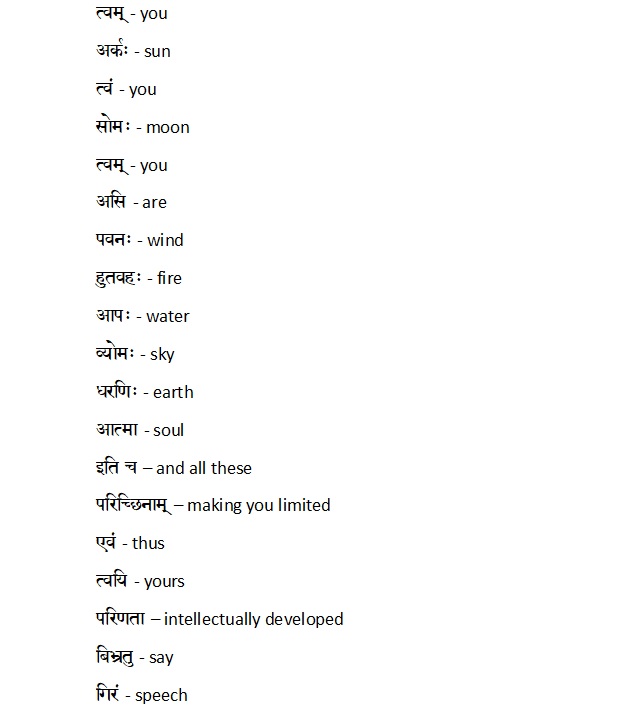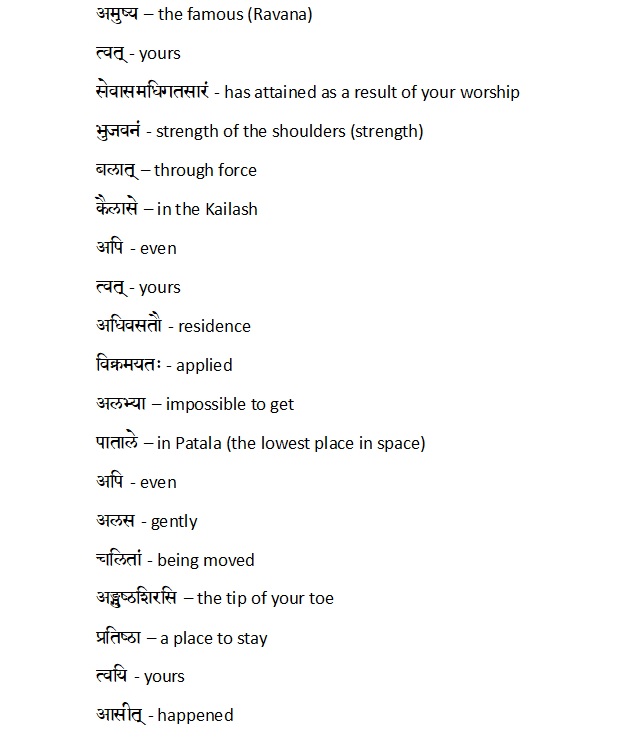Shiva Mahimna Stotra
Shloka 3


Meaning: O Lord Shiva! You are the creator of the nectar-like Vedas. Can the speech of even Brihaspati, the teacher of the Devas, amaze you? (Even though I am aware of this fact) O Puramathan! My intellect is engaged in singing this hymn thinking that by the merit of singing your glories I am purifying my speech.
Reflections: Pushpadanta establishes that Lord Shiva is Brahman who had created the Vedas.
The scriptures tell us that Brahman had created the Vedas:

Brahma Sutra (1.1.3): “Brahman is the source of the scriptures (The Vedas).”

Swetaswatara Upanishad (6.18): “In the beginning, the Lord (Brahman) had created Brahma (Its creator aspect) and revealed the Vedas to him.
Brihadaranyaka Upanishad (2.4.10): “As smoke comes out from a fire kindled with wet fuel, similarly the Rig Veda, the Yajur Veda, the Sama Veda, the Athrvangirasa, history, mythology, various branches of Knowledge, the Upanishads, verses, aphorisms, elucidations, and explanations are like the exhaled breath of this infinite Reality, the Supreme Self, Brahman. Indeed, It breathed forth all of these.”
The Vedas consist of life-giving or life-explaining ultimate truths. These have been expressed in beautiful poetic ways. Pushpadanta is aware of the fact that Lord Shiva as Brahman has created the Vedas, and so no one’s praises of Lord Shiva will amaze Him. Even the glories of Lord Shiva sung by Brihaspati, the teacher of the devas, who is most intelligent, and well-versed in speech, will not amaze Him. But, then why Pushpadanta is engaged in composing this Shiva Mahimna Stotra to describe Lord Shiva’s glories? Definitely, this singing will not amaze Lord Shiva.
Pushpadanta himself gives his reason. He says he was just trying to purify his speech by singing the glories of the Lord. What is the ‘punya’ (merit) of singing Lord’s Glories? To me, it is the result of an effort to fill the mind with positive and uplifting thoughts. It is the result of an acceptance of Ultimate Reality and the humbling surrender of the little ego of the body-mind to that Reality. Whatever we have in our mind, that is what we say, and we act accordingly. If our minds are filled with positive and uplifting thoughts, then our speech and actions also reflect these ideas. This way, we can get rid of impure thoughts, speech, and actions from us. This is the process of purification. Spiritual teachers give an example of an inkpot. Suppose it is filled with old dirty ink. One way to clean it is to keep pouring pure water into the pot and eventually, it will be cleaned. Pushpadanta says that he wants to purify his speech by singing the glories of Lord Shiva and that is the motive he has in his mind for composing this hymn. Indirectly, we also get a hint to purify our speech by singing this Shiva Mahimna Stotra.
M. asked Sri Ramakrishna, “How can we fix our minds on God?”
Sri Ramakrishna answered, “Repeat God’s name, and sing His/Her glories, and keep holy company; and now and then visit God’s devotees and holy men….” He also told M. to go in solitude and by reflecting upon ‘what is real and what is unreal’, realize that ‘God alone is real, the Eternal Substance and all else is unreal, means impermanent. Then, withdraw the mind from all the impermanent objects of the world.
The very first thing Sri Ramakrishna said is to repeat God’s name and sing God’s glory. It really helps to focus the mind on God. When the mind gets purified, consequently the speech and the actions also get purified.
In Kaivalyashtakam 5, it has been said:

“God is always residing where the devotees sing God’s name with devotion. Therefore, ‘repeating God’s name is enough’.
Sant Kabira says:

“The mouth which is not repeating Rama (God’s name), that mouth is filled with dirt. So, O My Brother! Sing Rama, Govinda, Hari (God’s names).”
When we are not repeating God’s name, we are talking about useless things and many times talking trash. When our mind is filled with spiritual consciousness, we are aware of what we are talking about, and we will not say meaningless or harmful words.
Let us sing God’s glories to purify our minds, speech, and actions.




































